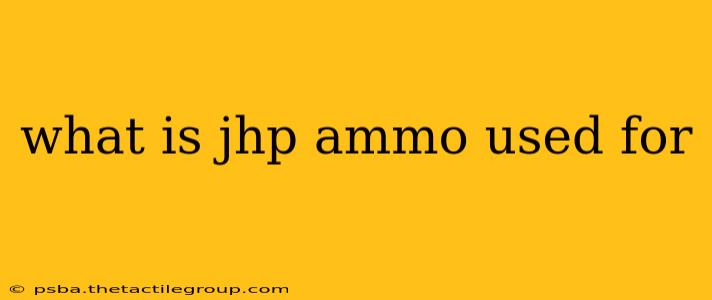JHP, or Jacketed Hollow Point, ammunition is a type of handgun and rifle cartridge designed for self-defense and hunting. Understanding its purpose requires exploring its unique design and resulting ballistic properties. This guide delves into the uses of JHP ammo, explaining its advantages and limitations.
Understanding Jacketed Hollow Point Ammunition
JHP ammo differs significantly from full metal jacket (FMJ) rounds. While FMJ bullets are designed to penetrate deeply, JHP rounds are engineered to expand upon impact, transferring more energy to the target and causing a larger wound cavity. This expansion is achieved through the hollow cavity at the tip of the bullet, which allows the bullet to mushroom upon impact, increasing its stopping power. The jacket, typically made of copper or another softer metal, helps maintain bullet integrity and prevents lead from fragmenting excessively.
Key Characteristics of JHP Ammo:
- Increased Expansion: The hollow point design promotes rapid expansion upon impact, increasing the bullet's diameter and creating a larger wound channel.
- Higher Stopping Power: The expanded profile and increased energy transfer contribute to a greater likelihood of incapacitating a target quickly.
- Reduced Penetration: While penetration is reduced compared to FMJ rounds, sufficient penetration is still crucial for effective self-defense. Over-expansion can lead to insufficient penetration.
- Controlled Expansion: Modern JHP designs focus on reliable expansion across a range of velocities and target materials.
Primary Uses of JHP Ammo:
1. Self-Defense:
This is arguably the most common use of JHP ammo. Law enforcement agencies and civilians alike utilize JHP rounds in handguns for personal protection. The increased stopping power and reduced risk of over-penetration (compared to FMJ) make it a preferred choice for situations where the potential for collateral damage is high. The goal in self-defense is swift incapacitation to minimize harm to both the defender and bystanders.
2. Hunting:
Certain JHP rounds are also suitable for hunting, particularly for smaller game animals. The expanding bullet creates a larger wound cavity, leading to a quicker and more humane kill. However, the reduced penetration of JHP ammunition means it's generally not ideal for larger game, where deeper penetration is required for a clean kill. The type of game and the specific JHP ammunition characteristics must be carefully considered.
3. Law Enforcement:
Many law enforcement agencies issue JHP ammunition to officers for both duty and training purposes. The balance between stopping power and controlled expansion makes it a suitable choice for situations requiring immediate neutralization of threats while minimizing risks to bystanders.
Considerations and Limitations:
- Over-Penetration: While JHP ammo is designed to reduce penetration, factors like the bullet's velocity, the target's material, and the angle of impact can all affect how deeply the bullet penetrates.
- Under-Penetration: Conversely, in some instances, the bullet may not expand sufficiently, resulting in under-penetration. This can be caused by various factors including the bullet striking dense materials, low velocity impact, or bullet defects.
- Fragmentation: Although JHP rounds are designed to minimize fragmentation, some degree of fragmentation can occur.
- Legal Restrictions: Regulations concerning the use and possession of JHP ammunition vary by jurisdiction.
Conclusion:
JHP ammo is a specialized type of cartridge offering advantages in self-defense and specific hunting applications. Its unique design results in increased stopping power and reduced penetration compared to FMJ rounds. However, it is essential to understand its characteristics and limitations before using it. Choosing the appropriate JHP round depends on the specific application, and responsible firearm handling practices are paramount. Always consult relevant laws and regulations in your area.

